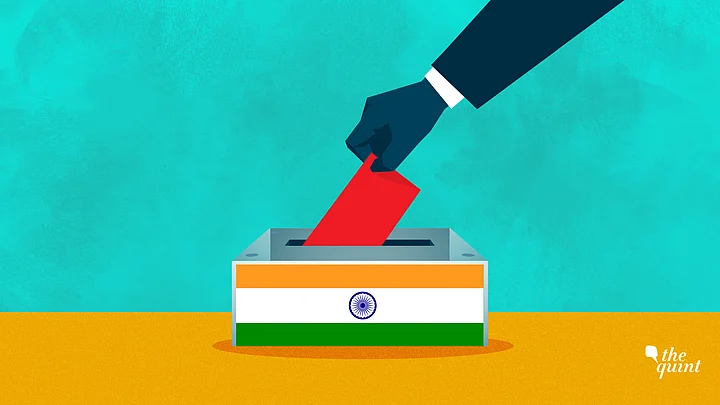(This excerpt has been published with the permission of Penguin Random House. Ornit Shani’s ‘How India Became Democratic: Citizenship and the Making of the Universal Franchise’ is available on Amazon. The excerpt has been extracted from the book’s Introduction, and sub-headings have been added by The Quint for the reader’s benefit.)
The Election Commission of India Record Room was a true treasure trove. The materials on the preparation of the first electoral rolls on the basis of universal franchise that lay at the bottom of long shelves at the back of the cool basement of the building, held the tale of a staggering bureaucratic endeavour.
The materials include 70 folders, containing more than 1,600 documents, among them correspondences between and among the Secretariat of the Constituent Assembly of India in Delhi, high-, mid- , and low- level public officials and with a wide range of civic organisations and people from across the country.
Between September 2010 – when I sought permission to inspect the files dealing with the planning and preparation of the electoral roll for the first elections – and September 2012, I consulted all these records at the Election Commission record room. Thereafter, the files were transferred to the National Archives of India, where archivists catalogued them for the first time.
Preparing the 1st Electoral Rolls
The files became available for review there from December 2012.
What impelled me to search the early records of the Election Commission was a question I had been asking of senior election management officials for some time, and for which I could not get a satisfactory answer. I asked repeatedly, how the first list of voters on the basis of universal franchise was prepared.
How, under the conditions prevailing in the country at the time, did they actually enroll millions of men and women?
The official Report on the First General Elections in India includes just over two pages on the ‘preliminary steps taken by the Constituent Assembly’ for the preparation of the electoral rolls. It states, with reference to the Constituent Assembly, that it was ‘decided that the work should be taken in hand immediately’, and that in November 1947, the Secretariat of the Constituent Assembly addressed the state governments on the matter, and notes some steps that were taken thereafter.
I could not find a record of such a decision by the Assembly in 1947, nor of the work of the Secretariat. It was clear to me that behind these two pages there lay a much bigger story.
Piecing Together the Jigsaw of India’s Electoral Democracy
Once I began reading the records, I found myself drawn into an overwhelming story. I read the records in daily instalments; my schedule set by the opening hours of the record room, or by the working hours of its keeper, Mr Mahto.
He suggested that I read the files upstairs in the air- conditioned library of the Commission. But I insisted on immersing myself in the files’ home, quarrying through the solid dust that covered the files. Excavating my way through to the ‘bottom of India’s electoral democracy’, I could gradually piece together the core plot.
But there were manifold stories within the main story. On each issue or question raised there were a series of opinion notes prepared by members of the CAS, who each, in their turn, wrote a note on the previous note. The string of notes started from the junior staff, who usually presented the subject matter, and ended with comments and revisions made by the Joint Secretary of the CAS, and sometimes the Constitutional Adviser.
These notes unraveled the thinking process that underlay the steps the CAS took for the preparation of rolls. From time to time, a member of the CAS prepared a note that recapped the ‘story’ of the preparation of rolls as it developed until that point. At the end of the working day I was left in great anticipation for the next, eager to find out how the CAS had replied to this person or that official.
What were their decisions on the matters they were grappling with? I was like Padma, from Salman Rushdie’s Midnight’s Children, keen to know ‘what happened next’.
No Mention of Women?
I began, I realised, to read the archive as a ‘serialised epic’: the epic of India’s democracy. In particular, as I encountered letters from ordinary people and read the notes of members of the Secretariat on these letters, I grew eager to know what ultimately happened.
I also grew in my admiration and appreciation of the real heroes of the making of the universal franchise in India: the staff of the Secretariat, under the leadership of BN Rau.
There has been much theoretical discussion over the last few decades about politics and statecraft in the fashioning of archival knowledge, its structure, and control of what materials are preserved or ‘lost’, and the limits these impose on the discursive possibilities that the archive allows.
These, of course, caution against the excitement in the face of new archival discoveries. The story of the preparation of the rolls in this book also draws on a variety of other sources. Nonetheless, it has been truly impossible, as a reader of these records, not to be profoundly inspired by them.
One striking omission in the archive of the preparation of the electoral rolls for the first elections, however, is that there was not a single letter from or to a woman. It is also clear that some of the material is missing.
I hope the following chapters will take the reader, as authentically as possible, with me along the archival trail.
